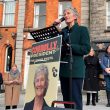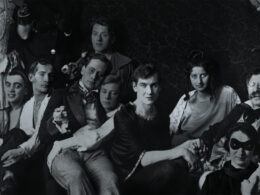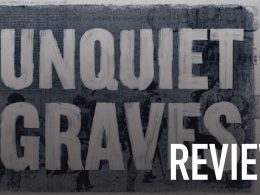By Kate Quinlan
For Those I Love, the musical project of Dublin musician and spoken word artist David Balfe’s August release Carving the Stone is a fierce and unflinching album that cements Balfe as a socialist cultural poet, giving voice to a generation shackled by capitalism, inequality, and civic disillusionment. He fuses spoken word with electronic instrumentals, with a beautiful tone and Dublin vernacular, compelling the listener to grasp the politics in every beat.
On ‘No Scheme’, Balfe laments the relentless grind of the working world. He spits raw truth: “There’s rent to pay so I trade my souls in as labour” and “We seize the means of chronic boredom from the bourgeoisie.” These lines lay bare the transactional nature of labour under capitalism, where one’s soul is commodified to survive. Supported by rave-y electronica, the track pulses with righteous anger and defiance.
In ‘Civic’, the creeping nihilism of modern life is laid bare. Balfe captures the emotional anesthesia of our endless scrolling: “The drone and tone of constant scroll has grown the boredom in my bones.” Digital drudgery has become another tool of pacification, dulling our capacity to feel, to fight, to care.
‘Mirror’ turns the rage toward far-right and nationalist demagoguery. Balfe’s words crack like bullets:
“Reprobate, ethnostate, modern nationalist c*nts
They manipulate young workers and then neglect them when done
The modern state will strip a man down until he’s naked and scared
And these c*nting blackshirts will give him a face to lace with his fears.”
This terrifying evocation of far-right exploitation reminds us who profits from fear – the ruling class, donning cheap propaganda to deceive the working class into self-destruction.
‘Of The Sorrows’, in Balfe’s words, is “about a city rapidly boxing you out and the choices you make to stay.” This sentiment echoes throughout the album and resonates deeply across Ireland, where rising rents and systemic exclusion drive so many from their homes. Balfe captures this crisis with brutal clarity: “I’ll stay trapped beneath the weight of a future ripped by thieves,” and “bankrupt yourself just to stay where you belong.” His sorrow here is not passive, it is a testament to endurance, defiance, and love for a city under siege.
In ‘I Came Back To See If The Stone Had Moved’, Balfe reflects on the fruitlessness of labour without justice: “my labour bears no fruit worth eating / Poisoned by the pain of the mistreated.” These lines ring as both elegy and rallying cry – if labour under capitalism enriches no one but the few, what is our mandate but to resist, to fight for redistribution, for dignity, for community?
Balfe’s amalgam of spoken-word urgency and club-ready electronica amplifies his socialist rhetoric, yet never feels didactic – the music pulses with empathy as much as it does with rage. This is art as resistance, musical poetry that bridges the personal, the local, and the political.
At its core, this is a record about class, community, and the crushing weight of austerity in modern Dublin. Balfe does not write from a distance, he speaks from the heart of a city where rents skyrocket, where working people exhaust themselves to merely exist, where futures are sold off piece by piece to developers and tech giants. The album’s socialist thrust is not abstract theory but lived experience: the everyday grind, the endless scrolling, the lure of the far right, the heartbreak of a city being stolen.
Yet despite the despair, there is solidarity woven through every track. Balfe reminds us that even amid alienation, art can galvanize, and that poetry can be weaponised against power. Carving the Stone is both a eulogy and a rallying cry, proof that Dublin’s working class still has a voice, and that voice refuses to be silenced.












